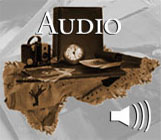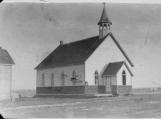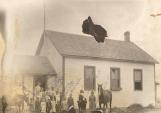14
Pioneer WomenOur pioneer women stood shoulder to shoulder with the men as they broke the land and established the communities we enjoy to-day. They raised their families and kept the home fires burning. They cooked on wood burning stoves on which they also heated water in the old copper boiler for wash-days and baths. The water was hauled in to cisterns or gathered in rain barrels and snow was melted in winter--it took a lot of snow for little water. The women made their own lye soap for washing clothes and cranked the wringer by hand after scrubbing the clothes on a scrub board. Clothes were placed on a clothes horse to dry--especially after freezing solid on the line outside to give them that ‘oh so fresh' smell. The sad irons, heated on the stove, pressed the clothes smooth and helped develop strong arm muscles just from their weight.
She milked the cows, separated the milk and churned the cream into butter. If there was more than the family could consume, she often traded fresh butter, along with eggs from the chickens she raised, for groceries when money was short. Many a hen was confused and wondered why her brood took to the water sometimes, not knowing their nests had been set with duck or goose eggs to be hatched. In the meantime, the housewife planted and cared for the garden, growing vegetables to store and preserve along with the fruit and meat that she canned. No refrigeration then. She cooked for harvest crews serving lunches and hot meals, baking cans full of cookies and scores of pies. She was probably the last one to bed by the evening lamplight and was up early with the morning sunrise.
She found time to socialize at local picnics, dances and concerts in the country school house. Visits to neighbouring homes to play cards or games or just a friendly visit helped to take away the loneliness on the open prairie.
17
Mabel: I think a lot of the pioneers trusted in God or through prayer and that. I mean they were lonesome or discouraged and their faith was in God.Judy: Grandma, your family have always been very religious. When you first came here, was there a church, or a minister or anything?
Mabel: Not when we first come. The Huggart's had a tent, and they used to have a service in that. A minister maybe come from Rouleau or someplace. They had to ride horseback.
Judy: That would be quite a ways for your family to go wouldn't it?
Mabel: Sometimes you walked. Well, then after the schools were built, they held service in the schools.
Judy: Did you have a minister come to do that?
Mabel: Yes, there was Baptist or Anglican or one would have it one Sunday maybe, and another, another Sunday. I was telling Maggie, my older sister was the only one who was married in a church. Even Sandy was married over here in the Manse where Kim Holland's living. Gerty was married down there and I was married in the other house where Stan and Margaret lived. When Maggie married Matt, they were married down here where Myrna Muc lives in that old house where Grandma was living then, in [19]26 I think. When I was married Reggie and the schoolteacher signed the register.
Judy: Would you have a dinner, or anything, after the wedding?
Mabel: We maybe had it before, because I think we took the train to Moose Jaw when we were married.
Judy: That would be your honeymoon?
19
We lived on the homestead and worked the land until I was old enough to go to school. There were no schools closer than the little town of Avonlea 40 miles away. So we would live on the homestead in the summer and move to town in the winter where dad would get a job to earn money. We built a two story house. It was also very small, but it had a living room and kitchen downstairs and two bedrooms upstairs. There was no bathroom. It was a little shack in the back yard. By this time there were 3 of us children. The school house was only one room and one teacher. She taught all the grades (one through eight) that was as high as you could go in school. There were about 20 students in school. In fact, I don't think there were more than 50 or 60 people in the whole town and the town consisted of a railroad station, a grain elevator and another building which housed the little general country store, the post office and the doctor's office. There was no drug store, nor any other building. The streets were dirt and there were no sidewalks.The weather in winter was bitterly cold. Temperatures of 40 below zero were very common and I have walked to school many times when the temperature was 50 degrees below zero and the snow would drift so deep we couldn't open our front door. We would have to climb out the upstairs window. Our school days were short. There isn't much sunlight in Canada in the winter time and classes usually began at 10 AM and let out at 2 PM.
The schools had a diverse ethnic group like the New York area. Only in Canada they were mostly from Norway, Sweden, Finland, Romania, England, Scotland, and Ireland. Many were descendants of Scottish fur trappers and some were even children of Scotch trappers and Indian girls. A large portion of the children in rural areas never went to school. My uncle Newt's kids didn't start until Dale, the oldest, was almost grown. They had moved to town for the winter.
There was lots of fun and there were a lot of hardships on the prairie, but I still own the old homestead and I fly up there every 4 or 5 years to see it. We sold our home in town for $600 and left Canada on the train ride back to the United States on August 8, 1922 and I've lived here ever since.
21
Donna: When was Sunshine School built?Mabel: Nineteen five.
Donna: Where did you go to school from 19[0]3 til 19[0]5?
Mabel: I didn't go anyplace.
Donna: So, there was no school for anybody to go to?
Mabel: No, I read the reader at home.
Donna: Had you gone to school in Ontario before you came here?
Mabel: Oh, yes, 'til I was nine.
Donna: How many years would you have gone to school?
Mabel: Well, I quit school in [190]8. The fall of [190]8 when Gerty was married, and never went back again.
Donna: Why were you not able to go back to school?
Mabel: Because my mother wanted me home.
Donna: She needed some help.
Mabel: Yes.
Ron: How far was the school away from your home?
Mabel: Oh, a quarter of a mile. It was on the east side of the road here as you go to Stan's. About a quarter of a mile from Dad's house down there.
Ron: How many students would have been in school when you went to school?
Mabel: Oh, I don't know, quite a few. I could show you a picture. There's a picture in the history book there of the Sunshine School. There were quite a few Armstrongs and Reids...
Ron: You mention the words New Warren School. This wasn't called Avonlea then?
Mabel: No, Avonlea wasn't here then.
Ron: There was New Warren District?
Mabel: Yes.
Ron: So, from Rouleau to Sunshine School, there was no town or anything?
Mabel: No. I got five cents a morning for putting on fires at Sunshine School.
Donna: Grandma, you don't remember the name of your teacher, do you?
Mabel: Oh, yes I would. There was a Miss Williams, was the first teacher we had. Miss McLaren, Mrs Van Dine. And this one was teaching when Violet was married in 19[0]6. I think Mrs. Van Dine maybe taught there twice, because I'm pretty sure she was with me when Mother and Dad went east in 1912, because I think we had Grandpa Harris at that time.
Donna: Did the teachers board at your house?
Mabel: Yes. Whether you had room or not. Like George Young boarded a teacher for years up there.
Ron: At Richburg District.
Mabel: Yes.
25
Pioneer Children's ChoresOctober, 1987
A farm near Avonlea, Saskatchewan, Canada
 Credits:
Credits:Mabel Watson
26
Donna: You're talking about the first summer you were here, you were living in the house by July and Mother and Johnny took Gerty up to Harris's, because a new baby was expected, and Mother left you to bake bread that she'd already prepared. How old were you then?Mabel: Nine
Donna: You were baking bread?
Mabel: Yes. She had them mixed overnight. You know, they set them overnight.
Donna: Was it in the pans already, or did you...?M
Mabel: Yes.
Donna: That's a pretty good chore for a nine year old. You knew when to take it out of the oven, did you?
Mabel: Yes, yes.
Donna: What other sorts of jobs would you have to do at that time? You were nine years old...
Mabel: I learned to milk cows.
Donna: Nine years old?
Mabel: Yes.
Donna: How many cows would you have had to milk?
Mabel: Well, maybe these ones that Ed Harris gave us. I think Father brought some from Ontario, but there were more heifers or calves or something, that younger stock that I ...
Lawrence: Didn't you tell me one day that you used to haul water from Tommy's place in a churn?
Mabel: Yes, over to Bob Reid's, lived near the dam there.
Lawrence: That'd be about 3 and a half miles, wouldn't it?
Mabel: Yes, well....
Lawrence: Four miles
Donna: You could handle the horses?
Mabel: One horse and a buggy.
Judy: Do you mean you had to go and get all the water?
Mabel: No, not all. But this water down here, it was maybe alright for the stock, but not to drink. There was too much alkali or something in it.
Judy: So, would you use the snow in the winter for your water?
Mabel: Well, but the coulees were full.
Donna: Grandma, I've heard you tell us at sometime or another about hauling wheat in a wagon to Rouleau. Now, why would you go all the way to Rouleau with the wheat?
Mabel: Before Avonlea, there was no railroad here.
Donna: When did the railroad come here [Avonlea]?
Mabel: [19]12
Donna: The railroad didn't come here 'til [19]12
Mabel: Or the fall of [19]11.
Donna: So, for how many years would you have to haul grain to Rouleau?
Mabel: Well, I don't know... We didn't have much [grain] the first year because Father and Johnny and Willy went away up to Lumsden someplace to work in the harvest. Mother and Reggie hauled in all the sheaves with a horse and a stone-boat off of ten acres of oats. I remember hauling wheat for Willy to Rouleau.
Donna: How old would you have been?
Mabel: I was a little older than that then.
Donna: Would you be 12 or 15?
Mabel: Yes.
Donna: How long would it take you to get to Rouleau?
Mabel: Well, it took a day. You'd feed your horses over there. Maybe come home and load up for the next day. Five hours maybe.
Donna: For one wagon box of wheat.





